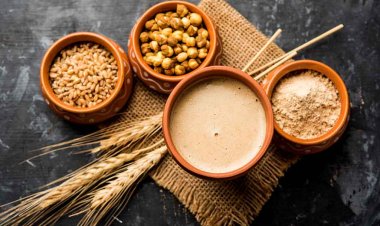5 Benefits Of Eating Raw Vegetables
In this article, we will discuss the benefits of eating raw vegetables, as well as the benefits of the raw food diet in general.

Benefits Of Eating Raw Vegetables: Everyone is aware of the numerous advantages of consuming vegetables.
From dark leafy green vegetables such as spinach, kale, Swiss chard and collard greens to cruciferous vegetables such as broccoli, cauliflower and Brussel sprouts, the numerous health benefits of consuming a wide variety of vegetables are one of the most uncontested concepts in the otherwise frequently contentious world of nutrition and diet.
However, where things get a little murky and debatable is whether it is better to cook your vegetables or eat them raw.
Some evidence suggests that cooking certain vegetables can help liberate some of the nutrients contained within them, thereby increasing their bioavailability, while other research indicates that raw vegetables retain more of their nutrients and antioxidants.
So, are raw vegetables healthy? What are the advantages of raw vegetables?
In this article, we will discuss the benefits of eating raw vegetables, as well as the benefits of the raw food diet in general, which entails consuming all foods in their uncooked state, including vegetables, fruits, seeds, and even proteins.
5 Benefits Of Eating Raw Vegetables

#1: Eating Raw Vegetables Can Contribute to Disease Prevention
The consumption of raw and cooked vegetables is inversely associated with epithelial malignancies, gastrointestinal cancers, and possibly breast cancer, according to one study.
However, the associations were stronger when raw vegetables rather than cooked vegetables were ingested, suggesting that raw vegetables may be more beneficial for disease prevention than cooked vegetables.
The researchers hypothesised that cooking alters the availability of certain nutrients, destroys the digestive enzymes naturally present in vegetables, and modifies their overall molecular structure and digestibility, potentially diminishing their health benefits and the ability of vegetable consumption to reduce the risk of cancer.
When deciding whether it is healthier or better for you to consume raw versus cooked vegetables, it is essential to consider which factors are most important to you in terms of what it means for a vegetable to be "better" for you.
One of the potential hazards of consuming raw vegetables, for instance, is contamination with bacteria or parasites.
The cooking procedure may destroy these pathogens, rendering the vegetable "healthier" in the sense that you will not be ingesting these harmful organisms. However, cooking a vegetable does not necessarily improve its nutritional profile.
When comparing the benefits of consuming raw vegetables versus cooked vegetables, it appears that the type of vegetable also matters.
For instance, dark leafy green vegetables like kale are nutritious and rich in essential vitamins and minerals, but they also contain oxalates, which can be detrimental to your health and are linked to the formation of kidney stones.
According to studies, the cooking procedure destroys some of these harmful compounds, suggesting that cooked kale is healthier than raw kale.
In addition, there is evidence that cooking tomatoes increases the bioavailability of the potent antioxidant lycopene, making cooked tomatoes preferable to uncooked.
#2: Eating Raw Vegetables Allows For Better Antioxidant Consumption
On the other hand, there is evidence that it is preferable to eat certain vegetables in their raw form, as this preserves some of the beneficial antioxidants that are present in the vegetables.
Cooking vegetables diminishes the bioavailability of carotenoids, which are powerful antioxidants found in orange and red vegetables like carrots, butternut squash, sweet potatoes, yams, acorn squash, and orange and red peppers.
Researchers discovered that the maximum levels of these beneficial compounds were found in the uncooked state, with grilling and microwave cooking having the most detrimental effect on carotenoid preservation.
As a result, one of the benefits of eating raw vegetables is that you obtain all of the antioxidants without reducing their potency and bioavailability.
#3 Eating Raw Vegetables Can Decrease the Risk of Cardiovascular Disease
Possibly due to differences in antioxidants and enzymes between raw and cooked vegetables, a massive study published in February 2022 by Frontiers in Nutrition concluded that eating raw vegetables may be preferable to cooking them.
The study followed nearly 400,000 participants in the UK Biobank for 12 years.
Only consumption of raw vegetables was associated with a reduced risk of cardiovascular disease and mortality, whereas consumption of cooked vegetables was not.
In addition, the inverse association between raw vegetable consumption and both cardiovascular disease incidence and cardiovascular disease mortality was dose-dependent, meaning that the greater the amount of raw vegetables consumed, the lower the associated risks.
After adjusting the data for various confounding variables, the results indicated that eating raw vegetables reduced the risk of cardiovascular disease by 82% and the risk of cardiovascular disease-related death by 87%.
Also read: Tips to spruce up your home with plants
#4: Eating Raw Vegetables Maximizes Nutrient Absorption
The heating procedure breaks down a portion of the cellulose and inulin found in vegetables, thereby decreasing their fibre content.
Moreover, raw vegetables typically retain all of their digestive enzymes. The presence of these proteins in certain vegetables, such as spinach, asparagus, and tomatoes (technically a fruit), can enhance the bioavailability of the nutrients and antioxidants found in the vegetable.
Because cooking can denature proteins and enzymes, your body may not be able to assimilate as many of the vegetable's nutrients.
#5: Eating Raw Vegetables Decreases Your Carbon Footprint
Although this is not particularly a health benefit of eating raw vegetables, it is nonetheless a raw vegetable benefit that raw vegetables are better for the environment than cooked ones.
In other words, eating raw vegetables is potentially healthier for the health of the environment as well as your own physical health.
The environmental benefits of eating raw foods are one of the raw foods diet benefits that encourage many individuals to adopt this diet and lifestyle approach.
Culinary any food increases your carbon footprint because it requires energy and produces greenhouse gas emissions, particularly if you use a microwave (which emits radiation in addition to requiring a great deal of energy) or other energy-intensive culinary methods.
Purchasing locally grown vegetables, joining a CSA (community-supported agriculture), or even growing your own vegetables can increase the sustainability and environmental friendliness of eating raw vegetables or following a raw foods diet.
It is essential to observe that not all vegetables can be consumed raw without risk.
Certain vegetables contain hazardous enzymes or natural toxins that must be deactivated by cooking prior to consumption. Lima beans, castor beans, cassava, red kidney beans, and eggplant are examples.
In the end, it's best for your health to eat as many fruits and vegetables as you can.
Whether you prefer to eat raw vegetables or prefer to have them steamed, sautéed, grilled, baked, broiled, boiled, microwaved, or even prepared in an air fryer, whichever preparation method or cooking state encourages you to consume the most vegetables possible is going to be best for your overall health.
You will not obtain the benefits of eating vegetables if you do not consume them at all or in sufficient quantities.
To put it another way, there is no harm in cooking your vegetables if it will encourage you to eat more of these nutrient-dense superfoods and make them a central part of your diet, even though there are some advantages to eating certain raw vegetables rather than cooked ones.













